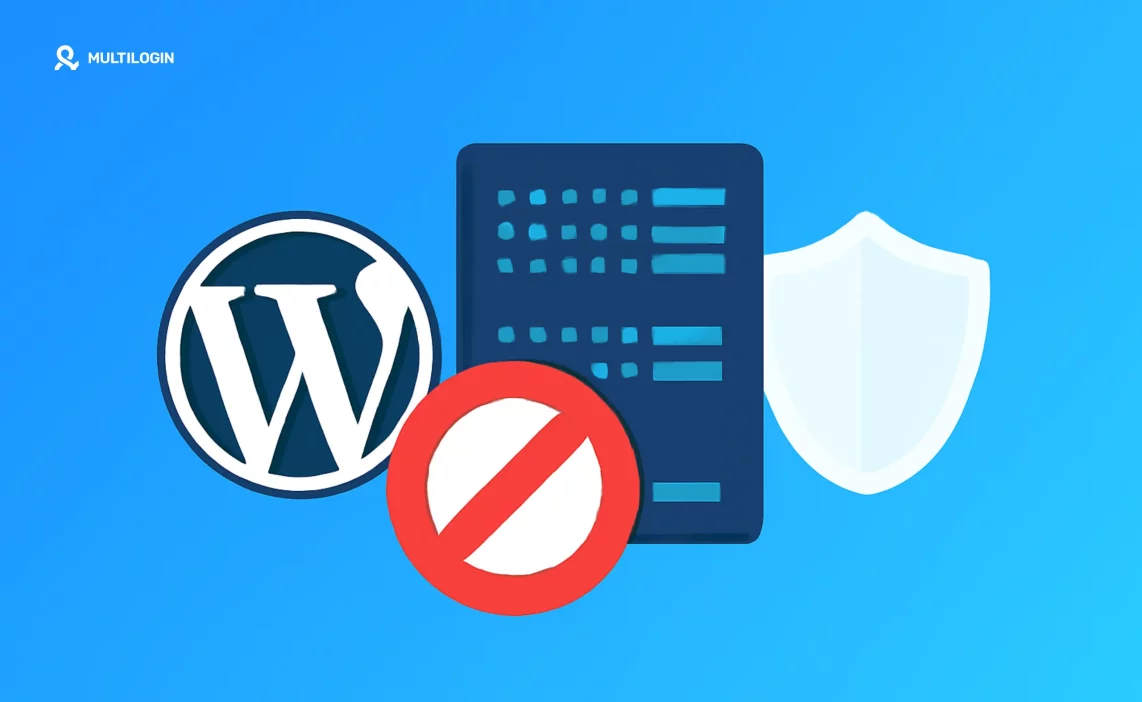Picture this scenario: A marketing agency faces a tight deadline, launching a major client campaign that depends on accessing their WordPress site. Suddenly, the entire office—designers, content team, project managers—gets locked out.
An error message flashes: “Access from your IP address has been blocked for security reasons.” Panic erupts. The team just hit a WordPress ban IP address error.
For digital agencies, web developers, and marketing firms, this isn’t merely an inconvenience; it’s a catastrophic interruption that risks client relationships and costs thousands in lost time. The core problem lies in automated security systems designed to protect against malicious bots that often can’t distinguish between a cybercriminal and a busy agency team working on a client’s site.
This comprehensive guide answers critical questions like “Why is WordPress blocking me?” and “How to unblock IP address in WordPress.”
More importantly, it moves beyond temporary fixes and reveals the professional-grade solution for safe, uninterrupted access and true multi-account management. The essential tool for any agency needing to manage multiple client sites without constant lockout fears emerges as an antidetect browser.
The IP Ban Explained: Why WordPress Blocks Legitimate Users
When blocks occur, the first thought typically runs to “Did I do something wrong?” The answer almost certainly remains no. The ban represents a symptom of robust, but often overzealous, security systems.
The Security Paradox: When Protection Becomes a Problem
The vast majority of IP bans on WordPress sites trigger through automated security measures. These typically implement through security plugins like Wordfence or iThemes Security, or at the server level by hosting providers. These systems protect against:
- Brute-Force Attacks: Repeated failed login attempts. A busy agency team member trying to remember a complex client password can easily trigger this response.
- Excessive Requests: Rapid, high-volume site access that mimics DDoS attacks or malicious scrapers. Five team members simultaneously accessing the dashboard, editing pages, and running updates can appear highly suspicious to automated firewalls.
- Malicious IP Lists: If an agency’s IP address was previously used by a malicious actor, or if the team uses a shared VPN that got flagged, preemptive blocks may occur.
This creates the security paradox: tools meant to protect client sites now actively prevent legitimate users from performing their jobs.
Does WordPress Track IP Addresses?
The short answer remains yes, but not in ways that directly cause bans. WordPress tracks IP addresses by default, logging the IP of anyone leaving comments on sites. Furthermore, security plugins actively log and monitor IP addresses for suspicious activity.
However, the ban itself gets enforced by security plugins or hosting firewalls, not core WordPress software. When that “Access from your IP address has been blocked” message appears, it means one of these layers flagged the IP and added it to a blacklist.
Understanding browser fingerprinting becomes crucial here, as platforms track far more than just IP addresses to identify and flag suspicious activity.
Can WordPress.com Server IP Be Banned?
This technical question highlights differences between two main WordPress versions:
- WordPress.com: This fully hosted, managed service makes it highly unlikely that WordPress.com would ban its own server IP addresses. IP bans here almost always target user-facing activity triggered by user behavior.
- WordPress.org (Self-Hosted): This version where users manage their own hosting sees the most common IP bans, as site owners maintain full control over security plugins and server-level firewalls that enforce blocks.
The Agency’s Nightmare: How to Fix an IP Ban and Regain Access
The moment that block screen appears, the clock starts ticking. Client work stalls, demanding immediate solutions. Several methods exist to unblock IP addresses.
The Unblock Checklist: How to Unblock IP Address in WordPress
Regaining access requires bypassing the block and manually removing IPs from blacklists. Here’s the professional checklist for fixing IP bans:
- Bypass the Block
When entire office IPs face blocks, access must first come from different IP addresses. Options include team members’ home connections, mobile hotspots, or clean, dedicated proxies.
- Locate the Blacklist
Bans typically store in three locations:
- Security Plugin Dashboard: Login from different IPs allows navigation to security plugin settings (e.g., Wordfence Firewall > Blocking) for manual IP removal.
- Server-Level Firewall: Check hosting provider control panels (cPanel, Plesk, etc.) for “Security” or “IP Blocker” sections.
- Database Access (phpMyAdmin): The most reliable method involves accessing site databases via phpMyAdmin, finding security plugin tables (e.g., wp_wfblocks7 for Wordfence), and deleting rows containing blocked IP addresses.
- Whitelisting for Prevention
Once access returns, immediately proceed to prevent recurrence through proper whitelisting.
Prevention Through Whitelisting: How to Safeguard Agency Access
For agencies, the best defense involves proactive offense. Security systems need clear signals that agency IP addresses remain safe and should never face blocks. This process, called whitelisting, provides essential protection.
Most security plugins offer settings to add “Whitelisted IP Addresses” or “IPs to Ignore.” Adding agency main office IPs and key remote team member IPs here ensures that even during flurries of failed logins, security systems ignore designated IPs and prevent lockouts.
The Limitations of Traditional Solutions for Agencies
While whitelisting provides good starting points, it doesn’t scale for modern, distributed agencies. This marks where traditional approaches fail and advanced multi-account management becomes critical.
The VPN Trap: Does a VPN Stop IP Bans?
Quick, desperate fixes often involve VPNs. But does a VPN stop IP bans? Only temporarily, often at high cost.
VPNs simply change IP addresses without altering browser fingerprints. When blocks occur because security plugins detect suspicious behavior, simply changing IPs only delays inevitable recurrence. Furthermore, many commercial VPN IPs already face flags and blacklisting by security plugins, meaning instant blocks from new IPs become possible.
The Inevitable Return: Do IP Bans Go Away?
Whether IP bans disappear depends on ban types. Temporary bans triggered by failed logins expire after set times (e.g., 30 minutes). However, severe or permanent bans require manual intervention.
Bans themselves symptomize deeper problems: platforms detecting suspicious activity. Without fixing root causes—the consistent digital fingerprints linking all activity—blocks continue regardless of how many times IP changes occur.
The Professional Solution: Advanced Multi-Account Management with Antidetect Browsers
For agencies managing dozens of client sites, problems extend beyond single IP bans to constant cross-contamination risks and scaling inability. Solutions lie in managing digital identities, not merely IP addresses.
The Agency’s Real Pain Point: Digital Fingerprinting
For agencies, problems compound. Teams manage multiple client accounts with different access levels from identical offices using identical computers. Every client site access leaves identical browser fingerprints.
These fingerprints—unique profiles of device hardware, software, and configurations—link all activity. When one client’s site flags team activity as suspicious, that fingerprint taints every other client site managed. This represents the silent killer of agency productivity.
Introducing Antidetect Browsers for Uninterrupted Access
This reveals where antidetect browser power emerges. Antidetect browsers like Multilogin create unique, isolated, and consistent digital identities for each client site or team member. This remains the only path to true multi-account management without cross-contamination risks.
Multilogin enables creating separate browser profiles with complete isolation from each other. Each profile functions as a virtual computer with unique digital fingerprints.
Multilogin’s Differentiators for Agency Workflow
Multilogin serves as the essential agency tool because it provides security and scalability that traditional browsers and simple VPNs cannot deliver:
- Unique Digital Fingerprints
For Client A’s WordPress site, Multilogin creates profiles appearing as Windows 10 users in London. For Client B’s site, profiles appear as Mac users in New York. To security plugins, these represent two entirely different, legitimate users.
- Integrated Residential Proxy Management
IP addresses remain crucial. Multilogin simplifies integrating residential proxy solutions. Dedicated, clean residential proxies can be assigned to each client profile, ensuring each access point maintains unique, untainted IP addresses. This far surpasses shared, flagged VPN IPs.
- Team Collaboration and Security
Multilogin allows secure sharing of client profiles with specific team members without ever sharing actual client passwords. This provides unparalleled security and auditability layers for multi-account management operations.
- Built-In Premium Proxies
Unlike basic solutions requiring separate proxy purchases, Multilogin includes premium residential proxies with 30+ million clean IPs. This eliminates additional costs and integration headaches while maintaining professional-grade access.
- Advanced Fingerprinting Technology
Each profile modifies 55+ parameters including canvas data, WebGL rendering, client rects, fonts, and hardware specifications. This ensures platforms perceive each profile as a completely different, legitimate device.
Addressing the Industry Shift: Why People Move Away from WordPress
The frequency of WordPress ban IP address errors symptoms a larger industry trend worth examining.
The Security and Maintenance Burden
Why people move away from WordPress often boils down to platform security and maintenance overhead. Because WordPress dominates market share, it represents a massive hacker target. This forces site owners to rely on complex security plugin and firewall stacks which, as demonstrated, often block legitimate users.
While shifts to platforms like headless CMS or static site generators prove real, millions of client sites still run on WordPress. Agencies must continue managing them. Multilogin provides necessary security and access layers that platforms themselves often lack, allowing agencies to work efficiently and safely regardless of underlying CMS systems.
The Professional Alternative
Rather than abandoning WordPress entirely, professional agencies implement proper access management infrastructure. This approach maintains client relationships while eliminating security friction that drives platform abandonment.
👉 Don’t risk bans: Try Multilogin and keep your accounts undetected.
Frequently Asked Questions About WordPress IP Bans
Yes, absolutely. Any website administrator or security plugin can easily ban IP addresses. This usually represents automated responses to suspicious activity, such as too many failed login attempts or excessive requests, which explains why WordPress ban IP address errors occur so commonly.
Duration depends entirely on security settings. Bans can be temporary (e.g., 30 minutes) or permanent. Permanent blocks require manually removing IPs from blacklists using methods described above.
An IP ban represents the action of denying access to specific IP addresses. A firewall block represents the mechanism (usually security plugins or server-level tools) that enforces bans. They constitute two sides of the same security coin.
No, VPNs don’t represent professional solutions. VPNs only change IP addresses without altering digital fingerprints, which advanced security systems use to link activity. For true safety and multi-account management, antidetect browsers like Multilogin prove necessary.
Blocks likely occur because platforms detect consistent browser fingerprints. Even with new IPs, device unique digital signatures (Canvas, WebGL, etc.) still face recognition and flagging as suspicious activity sources. This represents the exact problem Multilogin solves.
No. Free proxies almost always face sharing by thousands of users and heavy flagging by security systems. Using free proxies likely leads to faster, more severe bans. Always use clean, dedicated residential proxies integrated with antidetect browsers for professional multi-account management.
Stop Fighting the Ban, Start Managing Your Access
For agencies, WordPress ban IP address errors represent constant threats stemming from clashes between automated security and multi-account management needs. Relying on whitelisting single office IPs or using simple VPNs doesn’t constitute scalable, professional solutions.
The future of agency access and client management requires tools that manage entire digital identities. Multilogin represents that tool, providing necessary security and undetectability layers that allow teams to work on every client site, from any location, without cross-contamination fears or arbitrary IP blocks.
Agency teams shouldn’t let simple IP blocks derail client work and damage reputations. The antidetect browser guarantees safe, isolated access for every client and every team member.
Ready to scale operations without fear? Managing multiple client accounts requires professional infrastructure. Multilogin provides enterprise-grade multi-account management starting at just €5.85/month, with built-in residential proxies, advanced fingerprinting, and unlimited team collaboration.
Start transforming your agency workflow today and eliminate WordPress IP bans permanently with professional-grade access management that scales with your business.



